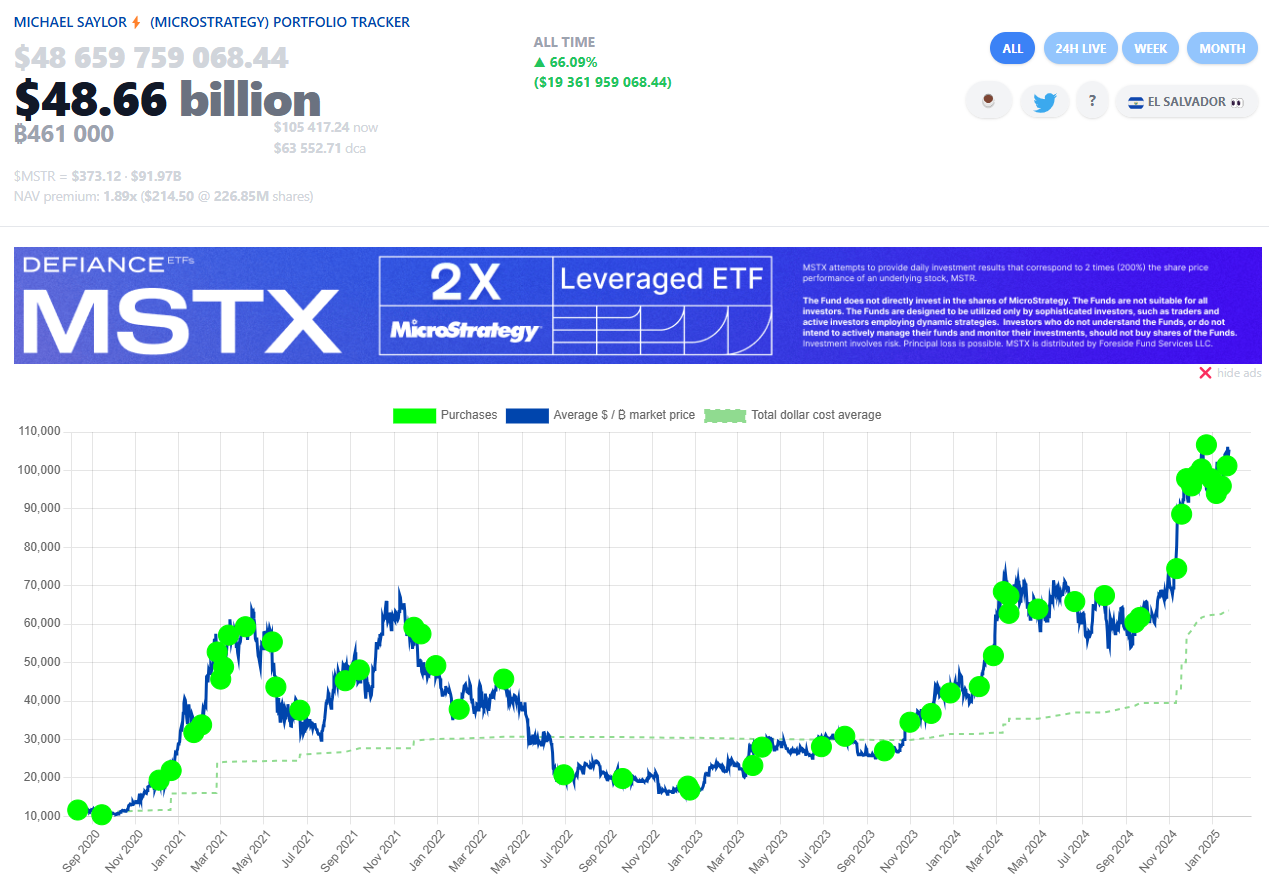MicroStrategy‘s Bitcoin portfolio has gained over $19.3 billion in unrealized profits and has seen significant value appreciation.
Despite never selling any Bitcoin, MicroStrategy may be required to pay taxes on its unrealized gains.
Michael Saylor’s MicroStrategy, the largest corporate Bitcoin holder, could owe federal income taxes on its unrealized gains under the 2022 Inflation Reduction Act.
The act introduces a “corporate alternative minimum tax,” which mandates a 15% tax on MicroStrategy’s adjusted earnings, according to a January 24 report by the Wall Street Journal.
However, the U.S. Internal Revenue Service (IRS) may create an exemption for Bitcoin under President Donald Trump’s more crypto-friendly administration.
MicroStrategy’s Bitcoin holdings have surpassed 450,000 BTC, worth over $48 billion, following the company’s purchase of $243 million in BTC on January 13.

MicroStrategy Bitcoin Portfolio, Unrealized Gains
MicroStrategy’s portfolio tracker indicates the company’s Bitcoin holdings have over $19.3 billion in unrealized gains.
This report comes six months after MicroStrategy agreed on June 3, 2024, to pay $40 million to settle tax evasion allegations against Saylor and the company.
The Attorney General of the District of Columbia sued Saylor and MicroStrategy in August 2022, claiming the executive had failed to pay income taxes in the district for at least 10 years.
MicroStrategy and Coinbase Push Back Against Corporate Alternative Minimum Tax
MicroStrategy and cryptocurrency exchange Coinbase have opposed the corporate alternative minimum tax (CAMT) regulation.
The two companies have requested the U.S. Treasury Department and IRS exclude unrealized crypto gains from the adjusted financial statement income (AFSI) to avoid “serious unintended consequences for U.S. corporations holding significant amounts of cryptocurrency.”
In a joint letter to lawmakers on January 3, the firms wrote:
“The unforeseen combination of CAMT and newly implemented accounting standards is creating unjust and unintended tax consequences… CAMT imposes a 15% minimum tax on any corporation with an AFSI averaging at least $1 billion over the previous three years.”
“Because the standard affects a corporation’s AFSI, companies with appreciated crypto (or enough other book income) subject to CAMT must now pay tax on unrealized crypto gains,” the letter stated.
U.S. Crypto Tax Laws Gain Prominence After IRS Issues 2024 Guidelines
U.S. crypto tax laws have gained attention following the IRS’s new guidelines in 2024. A regulation published in June 2024 mandates centralized crypto exchanges to report digital asset transactions starting in 2025.
The IRS stated the move would help investors file accurate tax returns. However, this could push crypto investors to decentralized platforms, making tax tracking more difficult.
The Blockchain Association filed a lawsuit against the IRS, arguing that including decentralized exchanges under the term “broker” is unconstitutional.
You can also freely share your thoughts and comments about the topic in the comment section. Additionally, don’t forget to follow us on our Telegram, YouTube, and Twitter channels for the latest news and updates.


